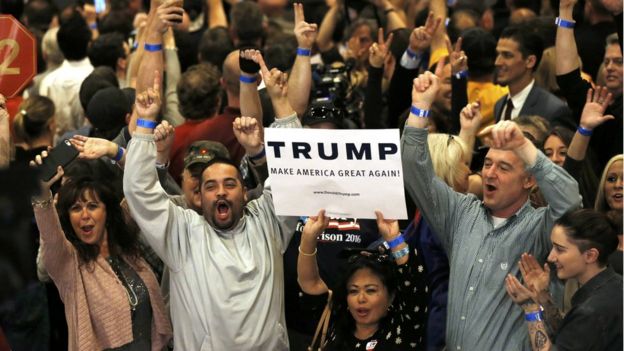Republican presidential candidate Donald Trump has easily won the US state of Nevada, cementing his lead in the race for party nomination.
The billionaire now has three consecutive wins, after victories in New Hampshire and South Carolina.
Senators Marco Rubio and Ted Cruz, who have been attacking each other this week, are vying for second place.
Party officials said they were looking into reports of double voting and not enough ballots at one caucus site.
Some volunteers also wore clothing in support of Mr Trump, but officials said this was not against the rules.
Nevada, typically a swing state with a substantial Latino population, is crucial to the election process. Hillary Clinton won the state on Saturday in the Democratic race.
Some 30 delegates – more than 1% of the total – are up for grabs in the Nevada caucuses, the first Republican test in the west of the United States.
Early results show Donald Trump has a 42% lead over the rest of the Republican pack, with his closest rival Marco Rubio getting 25% of the vote.
Cheers erupted at the Trump camp in Las Vegas as US networks started projecting the New York billionaire’s victory.
“We’re winning, winning, winning the country, and soon the country is going to start winning, winning, winning,” he told a roaring crowd of supporters during his victory speech.
Analysis – Anthony Zurcher, North America reporter in Las Vegas

Another state, another win for Donald Trump. Watching record crowds stream into caucus sites across the state, it’s become clear that the New York billionaire has reshaped the Republican electorate.
The Trump backers who have turned his massive campaign rallies into carnival-like events showed up to vote in force, with their Make America Great hats and patriotic garb. They braved long lines and, in some cases, poor organisation from a Republican Party ill prepared for the large turnout to vote for their man – and their man won.
Donald Trump, as inconceivable as it once may have been, has become the leader of a conservative populist wave that appears poised to crest and crash over the Republican establishment.
Ted Cruz and Marco Rubio are battling for a distant second place, but it seems like a cold consolation prize. Mr Trump is well positioned to rack up wins in the large slate of states across the South that vote in “Super Tuesday” next week, leaving him with a significant lead in the delegate count necessary to secure the Republican nomination.
Such a development would mortally wound Mr Cruz’s campaign and give Mr Rubio – or possibly Ohio Governor John Kasich – only a narrow hope of consolidating establishment support in time to derail a Trump juggernaut. The clock is ticking, and time is nearly up.
For the Democrats, Mrs Clinton beat rival Bernie Sanders by five percentage points, and both candidates are now focusing their campaigns on the black vote in South Carolina, where the next Democratic vote takes place on Saturday.
The aim of the primary and caucus races in the coming months is to determine which candidates will stand for the two main parties in the November presidential election.
The next Democratic and Republican votes will be crucial ahead of the “Super Tuesday” round on 1 March – when about a dozen states choose their party candidates, with about a quarter of all nominating delegates up for grabs.
The billionaire from New York locked horns with Texas Senator Ted Cruz on Monday, attacking his campaign tactics and describing his rival as “sick”. It comes after Mr Cruz fired his campaign spokesman over a doctored video that discredited Senator Rubio’s views on the bible.
Mr Cruz hit back on Tuesday, accusing Mr Trump of “vacillating” on his campaign issues and policies. Marco Rubio, meanwhile, has been urging registered Republicans to turn out in force for the caucuses.
“I need your vote tonight!” Mr Rubio, considered the preferred candidate among more moderate Republicans, told a rally on Tuesday.
The Republican race
Carson’s campaign grinds on – Things look grim for the retired neurosurgeon bid for the White House
Can this bartender’s son beat Trump? – Marco Rubio returns to his roots with the Nevada caucus
What is the difference between Marco Rubio and Ted Cruz? – The duelling senators have distinct styles
Rivalry between Mr Cruz and Mr Rubio – both Latino senators – has also intensified in recent days, with both candidates attacking each other on the campaign trail.
Elsewhere, retired neurosurgeon Ben Carson, who is trailing the Republican pack alongside Ohio Governor John Kasich, hit the headlines after suggesting US President Barack Obama had been “raised white”.
For his part, John Kasich is focusing campaign efforts on the bigger states of Virginia and Michigan.
The caucuses, which began at 17:00 local time (01:00 GMT Wednesday) and lasted three hours, allow Republican supporters to hold an open discussion about their favourite candidates before they vote in a secret ballot.
The Republican field, which numbered a dozen one month ago, has been whittled down to five, after one-time establishment favourite Jeb Bush dropped out of the race in South Carolina last weekend.
Key dates to come
27 February – South Carolina primary (Democrat)
1 March – ‘Super Tuesday’ – 15 states or territories decide
18-21 July – Republican convention, nominee picked
25-28 July – Democratic convention, nominee picked
8 November – US presidential elections
In depth: Primary calendar
–
Source: BBC

